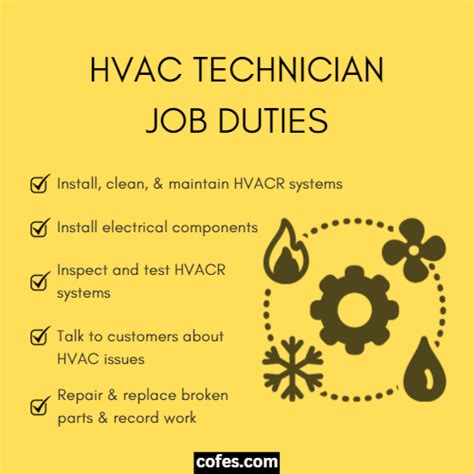As the world becomes increasingly aware of the importance of maintaining a comfortable and healthy indoor environment, the demand for skilled HVAC (Heating, Ventilation, and Air Conditioning) technicians continues to grow. An HVAC technician plays a vital role in ensuring that buildings, homes, and other structures have a reliable and efficient system for regulating temperature, humidity, and air quality. In this article, we will delve into the top 7 duties of an HVAC tech job description, highlighting the key responsibilities and skills required for this essential profession.
Understanding the Role of an HVAC Technician
Before we dive into the specific duties of an HVAC technician, it's essential to understand the broader context of their role. HVAC technicians install, maintain, and repair heating, ventilation, and air conditioning systems in various settings, including residential, commercial, and industrial buildings. Their work involves a combination of technical knowledge, manual skills, and attention to detail to ensure that HVAC systems operate efficiently, safely, and effectively.

Top 7 Duties of an HVAC Technician
1. Installation and Replacement of HVAC Systems
One of the primary duties of an HVAC technician is to install new heating, ventilation, and air conditioning systems in buildings, homes, and other structures. This involves carefully selecting the right equipment, connecting it to power sources, and testing the system to ensure it's working correctly. Additionally, HVAC technicians may be required to replace old or malfunctioning systems with new ones, which involves disconnecting and removing the old equipment, and installing the new system.
2. Maintenance and Repair of HVAC Systems
Regular maintenance is crucial to extending the lifespan of HVAC systems and ensuring they operate efficiently. HVAC technicians perform routine maintenance tasks, such as cleaning filters, inspecting ducts, and lubricating moving parts. They also diagnose and repair problems with the system, including issues with temperature control, air flow, and humidity levels.

3. Troubleshooting and Diagnostic Testing
When an HVAC system malfunctions or fails to operate efficiently, an HVAC technician must use their troubleshooting skills to identify the problem. This involves conducting diagnostic tests, such as checking for leaks, inspecting electrical connections, and analyzing system performance data. By identifying the root cause of the issue, the technician can develop an effective plan to repair or replace the faulty components.
4. Inspection and Testing of HVAC Systems
To ensure that HVAC systems are operating safely and efficiently, technicians must perform regular inspections and tests. This includes checking for proper ventilation, inspecting electrical components, and testing system performance. By identifying potential issues before they become major problems, HVAC technicians can help prevent accidents, reduce energy consumption, and extend the lifespan of the system.
5. Customer Service and Communication
HVAC technicians often work directly with customers, including homeowners, building managers, and facility operators. As such, they must possess strong communication and customer service skills to effectively explain technical information, provide maintenance recommendations, and address concerns or complaints.

6. Record Keeping and Documentation
Accurate record keeping and documentation are essential for HVAC technicians to track maintenance schedules, diagnose problems, and identify areas for improvement. This includes maintaining records of system performance data, maintenance activities, and repairs, as well as documenting customer interactions and service requests.
7. Safety and Code Compliance
Finally, HVAC technicians must adhere to strict safety protocols and code requirements to ensure that HVAC systems are installed, maintained, and repaired in a way that protects people, property, and the environment. This includes complying with local building codes, OSHA regulations, and industry standards for safety and performance.

Conclusion
In conclusion, the duties of an HVAC technician are diverse and demanding, requiring a combination of technical knowledge, manual skills, and attention to detail. By understanding the top 7 duties of an HVAC technician, we can appreciate the importance of their role in maintaining a comfortable, healthy, and safe indoor environment. Whether you're considering a career as an HVAC technician or simply want to learn more about the profession, this article has provided a comprehensive overview of the key responsibilities and skills required for success in this field.
Gallery of HVAC Technician at Work






What is the average salary of an HVAC technician?
+The average salary of an HVAC technician varies depending on location, experience, and industry. According to the Bureau of Labor Statistics, the median annual salary for HVAC technicians was $51,840 in May 2020.
What kind of training is required to become an HVAC technician?
+To become an HVAC technician, you typically need to complete a post-secondary training program in heating, ventilation, and air conditioning technology. These programs are usually offered at vocational schools, community colleges, or technical institutes.
What are the most common types of HVAC systems?
+The most common types of HVAC systems include air conditioning systems, heating systems, ventilation systems, and combination systems that integrate multiple functions.
